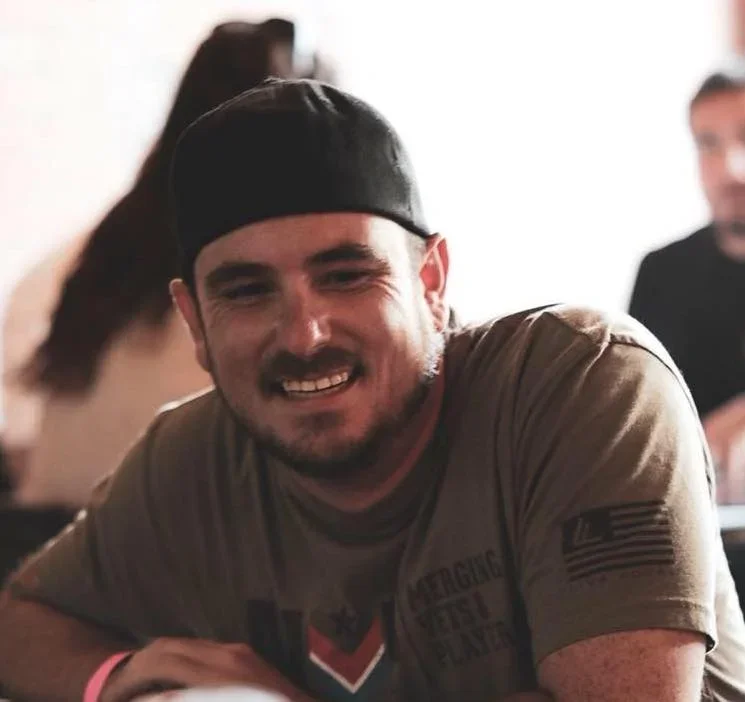Denver Morris
Before I Was Nobody - Now I’m A Somebody
Denver was born and raised in Orcutt, California, along the central coast near Santa Maria, with his mother, father, an older sister by two years and a 7-years younger sister.
He had a troubled youth—even though he was a star athlete in high school, he was kickedout at 15 for smoking weed. “I went to a continuation school and busted my butt to graduate. When I was in the 7thgrade, my grandpa, who had been in the army and was dying, told me: ‘Tiger, if you’re going to do anything, join the Marines where they’ll make you into a man.’” He joined the Marines two months after turning 18.
He was deployed to Iraq in 2007 and Afganistan in 2008. “I never like being told what to do, so when I was out on patrol, it wasn’t as much an issue.” When he returned to his base at 29 Palms in California, the stricter rules were a problem—like being told when to get a haircut. “I was done with the military after two wars, and I still wanted to party.” But because he was still under the drinking age, he felt like he didn’t fit in with his Marine buddies.
After receiving an Honorable Discharge, hislife started to spiral down. He met a girl and drove with her to New Jersey, only getting dumped theday after they arrived. He found jobs there and continued to party with new ‘friends’ until he became out of control and they were afraid of him.
He moved back to Santa Barbara and tried college under the GI Bill and worked at a retail job: “I didn’t apply myself and told myself ‘I’m worth more than this and quit. I was trying to get betterbut discovered how much I liked cocaine. People became afraid of me again, andI was depressed and attempted suicide. I didn’t feel worthy—once I was a hero and now I’m a nobody. At one of my lowest points, I was standing on a bridge when an off-duty cop saw what I wanted to do and pulled me off.”
He was taken to the VA’s hospital psych-ward for a 14-day hold. I was told I had to start treatment or I wasn’t leaving the hospital. At this point, he knew nothing about the VA services available to him or that he was owed back pay. He spent three months in treatment and then blew through all of the money including buying a truck. “I went to the VA homeless shelter and stayed nine months. When he left the shelter, he hooked up with new ‘friends’ who took advantage of him. “I had lost my identity, and OD’d on booze and cocaine again. When he passed out on the beach, two surfers found him and took him back to a hospital where he spent 27 hours.
“When I got out I knew I needed a new beginning. I was broke, was kicked out of my apartment and had sold the truck.” In December 2015 he went back to the Hollywood VA shelter for two months to figure out what was next: ‘I decided to change my life 180°and to stop playing the victim.” One day on the way to the showers, he saw someone with a camera shooting videos: “Hey, man, get out of my face with that camera!” It turned that man was Nate Boyer, a former vet, NFL player, and an MVP co-founder, who was doing a recruitment piece. “I sent Nate an email, and for the first time, I asked for help. He replied and asked me to meet him for lunch. I knew I couldn’t screw up this opportunity to ‘pick his brains’.”
At the time, Nate and Jay Glazer were trying to get MVP off the ground and invited Denver to bring eight friends to Jay’s gym to check out the new program. “I walked into the gym with no confidence. I told Jay my story and decided: ‘I love this—it’s just what I need.’”
“I now know that transitioning vets and former professional athletes have lost their identity and sense of family. Now my confidence is much stronger, and if I’m having an emotional moment, there’s someone at MVP to help me get back on track.”
Denver joined the MVP staff in December 2016, as a Program Coordinator. Even without a car, he traveled around Los Angeles on the bus talking to veterans to tell them about the program. On November 9, 2018, Denver and others from MVP were featured on a segment of Good Morning America in honor of Veterans’ Day, where the MVP team surprised him with a new car, paid his first year’s registration fee and insurance. “It’s going to help so many of us, not just me.”
When asked where he sees himself in five years: “I hope to stay with MVP as my career path. As more centers open across the country, I’d like to move up from a program coordinator position to a regional director.”
“Before I was a nobody, now I’m a somebody. When I wake up each morning I set two goals for myself. I tell vets they can’t do it alone—they need to be surrounded by somebody from the outside to validate their self-worth. Hold on tight—life’s a roller coaster!”

